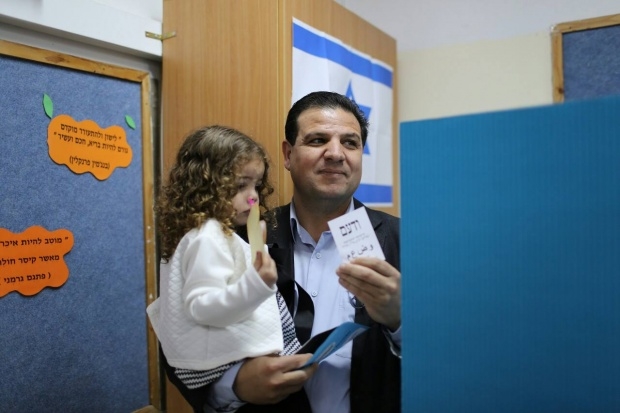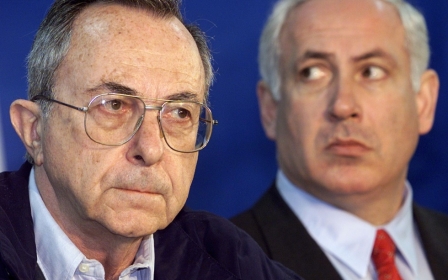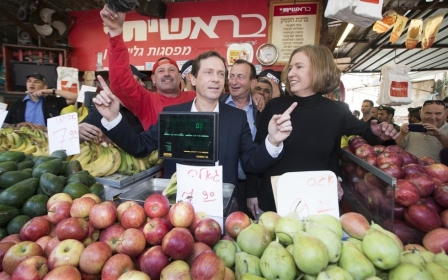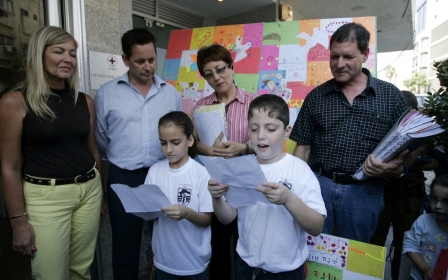Jerusalem divisions emphasised by Israel's general election

In central Jerusalem, a party atmosphere has taken over for the day of Israel’s general election. By midday, the Jewish market was filled with families and young people, taking the opportunity to enjoy a day off in pavement cafes and restaurants; a short walk away, the city’s central bus station was teeming with residents taking advantage of free transport to the home towns where they're registered to vote.
Politically, energy here is focused firmly on the right wing. On the streets the campaigning presence of blue-and-white flags and banners emblazoned with grave statesmen's frowns was dominated by Prime Minister Benjamin Netanyahu’s Likud, with a strong showing for smaller right-wing parties too.
Noam, 17, was unable to vote in today’s elections but was among the many young people who spent today campaigning for Likud. “We want to do our bit. Bibi has to win today,” she and her friends said, referring to a popular nickname for Prime Minister Netanyahu.
“Our aim is not to have someone on the left. We believe in Israel and we believe in Eretz Israel (Greater Israel), it’s all of our land and it belongs to us. We don’t want someone to give out land to the Arabs,” Noam explained.
“I think (Naftali) Bennet is very important, too, but maybe later,” she said, referring to the leader of the far-right religious party Jewish Home. “For now he doesn’t have enough votes to make a good impression so we’re going for Likud.”
Noam and her friends were horrified by the prospect of Isaac Herzog, leader of the Zionist Union coalition, heading up the next government.
“Oh my god no. He doesn’t know how to interview,” they said.
Eliezer, who owns a butchers shop, also planned to vote for Likud. “It’s my land. I live here and I work here,” he said. “I’ve always voted Likud and I think, and hope, things will get better under Netanyahu.”
Despite Likud's obvious popularity in this part of Jerusalem, however, many voters have tired of so many years of Netanyahu, and are looking for something new. Eric, 60, said he voted for Likud in the last election but believes that the country needs a change.
“I'm voting for the Zionist Union. We have two big parties, and if after four years one doesn't work then we need a change,” he said. “We don't want Netanyahu to be a Ceasar. He has been in control for nine years, and I support him, but he's failed. I have the right to change my mind.”
Shelley, 19, had cast her vote for the Jewish Home party. “Because I'm a religious Zionist, the rest is self-explanatory,” she said, explaining her ballot choice. “It's not like they'll get into power, but I think it's important to cast a vote for the right.
“If the left wing gets into government, I’m okay with it,” she said. “It might spice things up a bit.”
Across Jerusalem, in the Israeli annexed Palestinian east of the city, evidence of the election is nearly impossible to find. Here, few Palestinians are able to vote and most are indifferent to the makeup of a government they say will never represent them.
“Netanyahu is rubbish. Abbas is rubbish. Every day we have problems,” Ahmad, 48, said, gesturing to the armed Israeli presence close to his shop on Via Dolorosa. “No-one in politics is doing anything for us. The Israeli government is no government for us.”
Like the vast majority of Palestinians in East Jerusalem, Ahmad lives under Israeli control, but isn’t able to vote in today’s election. Most East Jerusalemites hold Permanent Residency status in Israel, a position that grants fewer rights than citizenship. Although they can vote for municipal representation, Permanent Residents can’t vote in the Knesset elections so don’t have a say in the running of the country.
'We are not Israelis' - Palestinian apathy in East Jerusalem
Across the Old City men and women echoed Ahmad’s disinterest in Israeli politics. Many include the West Bank Palestinian Authority – which has no power in East Jerusalem – among those that are politically irrelevant to their daily lives.
“The Palestinian Authority, the Israeli government, they’re all terrible,” 35-year-old Yusuf, a taxi driver, said. “Ayman Odeh, I’m not interested in him. It’s all the same there, it’s Israel. We want someone who will rule properly, by religion.”
Dinia, 32, who works at her family’s clothing shop, said she knew nothing about the parties running in the election, and had no interest in learning about it. “It’s Israel, it’s nothing to do with us,” she said.
Palestinian East Jerusalemites do have the opportunity to apply for Israeli citizenship if they meet certain conditions, including swearing an oath of allegiance to Israel and speaking some Hebrew, but most do not. The reasons for this are chiefly political – not least that accepting citizenship appears to consent to Israeli sovereignty over the city – but among the several thousand that have applied only about one third are accepted outright.
Mahmoud Qareen, an activist from East Jerusalem, was also pessimistic about today’s election, but said that he was watching the news closely nevertheless.
“I’m really curious to know what will happen with the Palestinian Knesset members in the union – whether they’ll be able to do anything,” he said. “I personally believe we have to boycott the election to show that we don’t accept the basis of the state of Israel, because nothing really will make any change. It’s the same in municipality elections. We don’t vote, because it doesn’t make any difference.”
In areas like Abu Dis, disconnected from Jerusalem by the separation wall, residents do not have the opportunity to apply for citizenship although Israeli policy has an enormous impact on daily life. Experience of occupation under both sides of the political spectrum mean most West Bank Palestinians believe there is little difference between the various parties competing for the Israeli vote today.
“They all want the same thing. They say they have different ideas, but in the end they all want to get to the same place,” Oraiba, a 21-year-old student, says. Expansion of Israel – or at least the protection of its interests – at the expense of the Palestinian state, he believes, is the shared aim of all parties. “One just goes in a straight line, the other takes a winding route – doing negotiations, being nice, all these things, but eventually they want to get back to the same place.”
But while there’s no best outcome, Oraiba says, there are considerations when it comes to judging the election result. “Maybe the more left wing parties will not be so hard on the West Bank. They might make it easier for us to move around, or decrease how much the army is around. It’s a small effect, but we do care.”
The pragmatism of voting in the elections, for those Palestinian citizens of Israel that can, is something Qareen respects – although he still believes, ultimately, that voting is counterproductive.
“They have a right to try. We have a very different situation to them. They want to become stronger, to have more rights,” he says. “As Palestinian activists, when we vote we can see it makes the face of Israel more democratic. By voting, we’re helping them to publish this impression to the whole world.
“We are not Israelis. We don’t want more rights. The only right we want is to live under the Palestinian flag,” he said.
New MEE newsletter: Jerusalem Dispatch
Sign up to get the latest insights and analysis on Israel-Palestine, alongside Turkey Unpacked and other MEE newsletters
Middle East Eye delivers independent and unrivalled coverage and analysis of the Middle East, North Africa and beyond. To learn more about republishing this content and the associated fees, please fill out this form. More about MEE can be found here.




